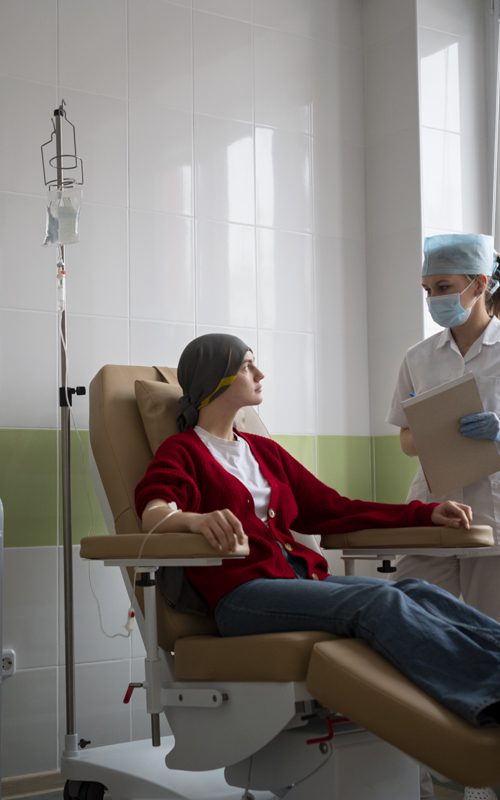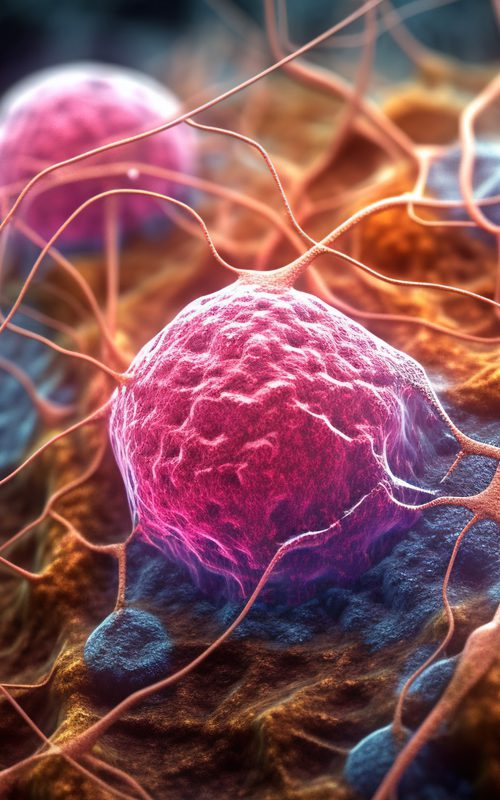Understanding chemotherapy: what is it and how does it work?
Chemotherapy is a medical treatment commonly used to treat cancer. But how does it work? This comprehensive guide will tell you everything you need to know about chemotherapy, including its side effects, how it works and the different types of treatment available.
WHAT IS CHEMOTHERAPY?
Chemotherapy is a medical treatment that uses drugs to destroy cancer cells.
These medicines are often given intravenously, but can also be given in form of tablets or liquids. It can be used alone or in combination with other treatments, such as radiotherapy or surgery.
Chemotherapy can take one of the following forms:
Systemic chemotherapy – This type of chemotherapy is taken by mouth or injected into a vein (intravenously) and circulates in the blood to reach all parts of the body. It can be used to treat cancers throughout the body, such as leukaemia or brain cancer.
Intravenous chemotherapy – This type of chemotherapy is given directly into a vein, usually through an IV (intravenous) line inserted into one of your veins. It may be used instead of systemic chemotherapy in certain situations, such as if you have an infection or if your bone marrow has been suppressed by previous radiotherapy.
Although chemotherapy can be effective in treating cancer, it can also have significant side effects, such as tiredness, hair loss and nausea.


DISEASES TREATED WITH CHEMOTHERAPY
The most common types of cancer treated with chemotherapy are:
- Acute lymphoblastic leukaemia (ALL)
- Acute myeloid leukaemia (AML)
- Breast, ovarian, lung, prostate and colorectal cancer
- Chronic lymphocytic leukaemia (CLL)
- Hodgkin’s lymphoma
- Non-Hodgkin’s lymphoma
Breast cancer is the most common type of cancer in women. It is also one of the easiest to treat, with a cure rate of over 90%. But if it is not detected in time, it can spread quickly and become fatal.
Breast cancer is the name given to a group of cancers that develop in breast cells. Both men and women can get breast cancer, but it is more common in women.
Chemotherapy is not routinely given. Its usefulness depends on the stage of the cancer, in other words, its extent and histological type.
HOW DOES IT WORK?
Chemotherapy works by targeting cells that divide rapidly, such as cancer cells. Drugs interfere with the process of cell division, stopping cancer cells from multiplying and spreading. However, these drugs can also affect healthy cells that divide quickly, such as skin, hair and stomach cells, which can cause side effects. This therapy is often given in cycles, with periods of treatment followed by periods of rest to allow the body to recover.
DIFFERENT TYPES OF CHEMOTHERAPY
There are several types of chemotherapy, each with different medication and potential side effects.
The most common types of chemotherapy include:
Adjuvant chemotherapy, which is given after surgery to remove any remaining cancer cells,
Neoadjuvant chemotherapy, which is given before surgery to reduce the size of the tumour.
Palliative chemotherapy is used to relieve symptoms and improve the quality of life of patients with advanced cancer.
The most common types of chemotherapy are:
- Alkylating agents: These work by binding to DNA and stopping it from replicating. They are used for a wide range of cancers, including lymphomas, sarcomas and testicular cancer. They may be given as part of a combination treatment or alone.
- Antimetabolites: These drugs inhibit cell growth by blocking the production of necessary molecules in the cell nucleus. Examples are fluorouracil (5-FU) and methotrexate (MTX). MTX is also used as an adjuvant after surgery in patients with bowel or breast cancer who have high levels of oestrogen in their bodies.
- Antiproliferative: These drugs stop cells from dividing and growing.
These drugs may be given intravenously, orally or topically, depending on the type of cancer and its stage.
THE SIDE EFFECTS
Although chemotherapy is an effective treatment for cancer, it can have unwanted side effects. The most common side effects of chemotherapy are tiredness, hair loss, nausea and vomiting, diarrhoea, infections and bleeding. Side effects depend on the type of chemotherapy drug used, the dose and the length of treatment. Patients should discuss possible side effects with their doctor before starting chemotherapy and report any side effects immediately.
HOW TO PREPARE FOR CHEMOTHERAPY
Before starting chemotherapy, it is important to prepare yourself physically and mentally. This may include changes to your diet, exercise routine and general lifestyle. It is also important to talk to your doctor about any medicines you are currently taking, as some medicines can interact with chemotherapy. Finally, it is important to have emotional and practical support, such as a friend or family member to accompany you to sessions and help you manage any side effects.


